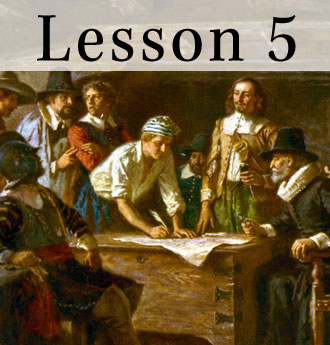The Resource Center » Level 3 » Unit 1 »
Lesson 5: What Basic Ideas about Rights and Constitutional Government Did Colonial Americans Hold?

Lesson Purpose
This lesson describes how basic ideas of constitutional government were developed and used in the American colonies before independence from Britain. It explains how social and economic conditions in America sometimes required old ideas about government to be adapted or discarded. Occasionally the colonists needed to create entirely new institutions.
Lesson Objectives
When you have finished this lesson, you should be able to
- describe the early development of America’s traditions of constitutional government,
- explain why the American colonists attached special importance to such constitutional principles as written guarantees of basic rights and representative government, and
- evaluate, take, and defend positions on the differences between life in colonial America and in England during the same period, the relationship between natural rights theory and slavery in America, and how natural rights philosophy and history help to explain the colonists’ views of the proper role of government.
Lesson Terms
charter
A written document from a government or ruler that grants certain rights to an individual, group, organization, or to people in general. In colonial times, a charter granted land to a person or company along with the right to found a colony on that land.
constituent
covenant
indentured servant
magistrate
Mayflower Compact
suffrage
Lesson Biographies
James I (1566-1625 CE)
King of Scots (1567-1625). King of England (1603-1625). James was son of Mary, Queen of Scots. He sought to assert the divine right of kings.
Franklin, Benjamin (1706-1790 CE)
Paine, Thomas (1737-1809 CE)
Hamilton, Alexander (1755-1804 CE)
Lesson Primary Sources
The Fundamental Orders of Connecticut, 1639
The Fundamental Orders describe the government to be established by the Connecticut Colony as a self-governed entity. The document bears many features of a written constitution and is the basis of the state's nickname, The Constitution State.
Mayflower Compact, November 11, 1620
Petition for a Charter of New England, March 3, 1619
The Combination of the Inhabitants Upon the Piscataqua River for Government, 1641
The Fundamental Constitutions for the Province of East New Jersey in America, 1683
Charter for the Province of Pennsylvania 1861
Charter of Georgia, 1732
The Charter for Rhode Island and Providence Plantations July 15, 1663
The First Charter of Virginia, 1606
A Modell of Christian Charity ("City Upon a Hill" sermon)--John Winthrop, 1630
Abolition of Star Chamber
Maryland Toleration Act, 1649
Bacon's Declaration 1676
Governor Berkeley's Response to Bacon's Declaration 1676
The Fundamental Constitutions of Carolina 1669
Indenture Contract of William Buckland 1755
Indenture Contract of Richard Lowther, 1627
Articles of Association 1774
Declaration of Rights and Grievances of the First Congress of the American Colonies, 1765
A Declaration by the Representatives of the United Colonies of North-America, Now Met in Congress at Philadelphia, Setting Forth the Causes and Necessity of Their Taking Up Arms
Declaration of Independence 1776






